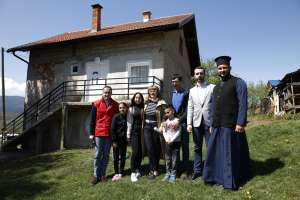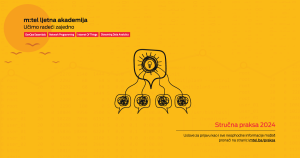SARAJEVO, May 18 (FENA) – People in the Western Balkans frequently breathe some of the most polluted air in the world and air pollution remains the leading environmental risk factor contributing to the largest combined share of death and disability in the Western Balkans.
The negative effects of pollution continue to mount in the region - including health, environmental, and economic impacts.
Over the last fifteen years, the World Bank has invested more than $250 million to improve energy efficiency and reduce air pollution and greenhouse gas emissions across the region - including initiatives to reduce overall heat demand, replace outdated firewood and coal boilers, and increase the use of more efficient lighting.
One afternoon in late February 2021, Pristina, the capital of Kosovo, registered an Air Quality Index (AQI) rating of 298, topping Lahore, Pakistan, Ulaanbaatar, Mongolia and nearly 100 other cities on the Swiss IQAir website to earn the dubious distinction of having the worst air quality of any major city on the planet at that moment. Throughout that same day, the capitals of Bosnia and Herzegovina, North Macedonia, and Serbia all registered AQI ratings of between 165 and 214 – levels considered either ‘unhealthy’ or ‘very unhealthy.’
People living in Sarajevo, Skopje, Belgrade, and countless other cities throughout the Western Balkans frequently inhale some of the most polluted air in the world – particularly during the winter months, when pollutants from coal plants, residential heating, vehicles, industry, and other sources black-out the sun, pollute the environment and create dangerous conditions for breathing. With 175 deaths per 100,000 people in 2019, Serbia topped a list of death rates from pollution among European countries and placed 9th overall on the global list – higher than India.
As the negative impacts of pollution continue to mount in the region, policymakers there continue to explore multifaceted approaches to overcoming the health, environmental, and economic impacts of these challenges.
"We are all well aware of what can be done,” says Rijad Tikveša, President of the Ekotim Association for the protection and advancement of nature, environment, and health in Bosnia and Herzegovina.
According to Tikveša, there are three primary recommendations for policymakers: “Lower emissions, lower emissions, and lower emissions.”
“There are three basic directions to act,” continues Tikveša, “lower emissions from heating, transport, and energy facilities - with the latter meaning to phase out existing facilities, which produce and consume massive quantities of coal and are the source of enormous pollution.’’
In addition to the negative environmental impacts of emissions in the Western Balkans, these pollutants are both costly and lethal. Emissions from heating, power plants, solid fuel-burning stoves and other sources combine to form airborne particulate matter (PM) that can be inhaled when it has a diameter of fewer than 10 microns. Exposure to PM 2.5 matter is particularly dangerous to health, as these particles can find their way deep into the lungs and the bloodstream. In Bosnia and Herzegovina, as many as 3,300 people are estimated to die prematurely every year as a result of exposure to ambient PM 2.5 air pollution. This estimate is 1,600 deaths in North Macedonia and 760 deaths in Kosovo.
Air pollution remains the leading environmental risk factor contributing to the largest combined share of death and disability in the Western Balkans. Furthermore, the estimated annual economic costs associated with the health damage from this pollution is staggering, averaging $240 million in Kosovo (3.6% of GDP), $750 million in North Macedonia (6.9% of GDP), and $1.38 billion in Bosnia and Herzegovina (8.2% of GDP) in 2016.
The health and economic challenges posed by toxic particulates are compounded by other pollutants, which degrade air quality, contribute to greenhouse gas emissions, and negatively impact the quality of life of every individual living in the Western Balkans. Recognizing these growing challenges, leaders in the Western Balkans have ambitiously declared their intention to work toward a 2050 target of a carbon-neutral Europe, as outlined in a joint declaration in November 2020, and the World Bank remains committed to supporting this goal.
This support includes the implementation of projects designed to address the challenges of air pollution, based on analysis conducted to better understand the problem that can underpin the design of these interventions in order to maximize their effectiveness in lowering emissions, improving health outcomes, and decreasing the economic impacts of air pollution.
Over the last fifteen years, the World Bank has invested more than $250 million to improve energy efficiency and reduce air pollution and greenhouse gas emissions across the region - including initiatives to reduce overall heat demand, replace outdated firewood and coal boilers, and increase the use of more efficient lighting.
Projects in Bosnia and Herzegovina, Kosovo, Montenegro, North Macedonia, and Serbia have been instrumental in helping reduce energy consumption and the use of fossil fuels in buildings – boosting energy efficiency and reducing local and global emissions around the region. In Kosovo, this work is expected to create energy savings equivalent to around 15% of the country’s annual demand for electricity. In Bosnia and Herzegovina, energy efficiency measures are helping demonstrate the large energy savings potential and co-benefits associated with improvements in public buildings - with lifetime energy and carbon savings of 61 retrofitted buildings estimated to be equivalent to taking 80,000 cars off the street.
Going forward, the World Bank will continue to assist countries in the Western Balkan as they green their economies by investing in clean energy sources, assisting in closing heavily polluting mines in environmentally and socially responsible ways, and helping increase energy efficiency and reduce the footprint of their economies.
This work includes a new study on the sustainability of heating in Bosnia and Herzegovina, Kosovo, and North Macedonia, designed to help governments identify sustainable alternatives to replace highly polluting systems, while simultaneously analyzing policy and regulatory reforms to promote sustainable heating and determine financing mechanisms to help the residential sector transition to more sustainable options.
While challenging, this de-polluting and de-carbonizing agenda for the heating sector in countries has the potential to be one of the most effective and rewarding interventions in this sphere.
The greening of economies around the Western Balkans will mean all citizens can thrive economically while breathing clean air and drinking clean water – a triple win for boosting livelihoods, improving health, and creating sustainable growth toward a cleaner, healthier future.
(FENA) S. R.









